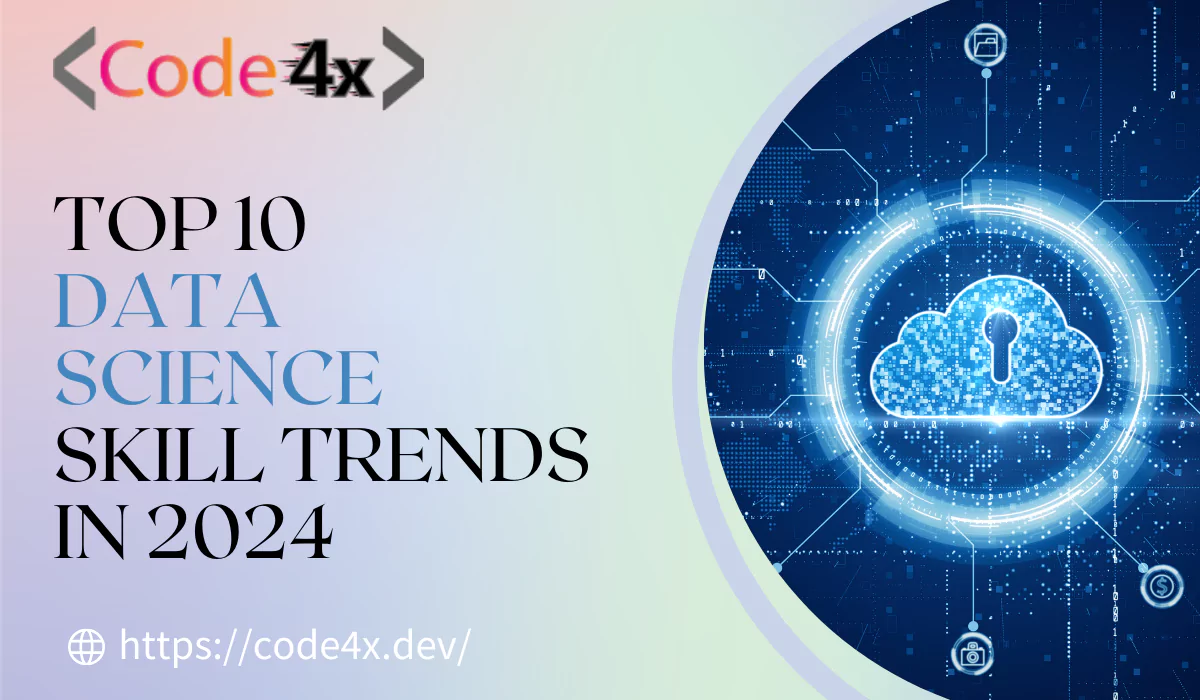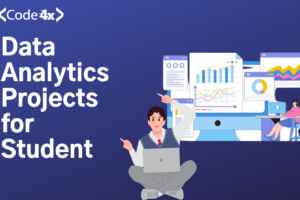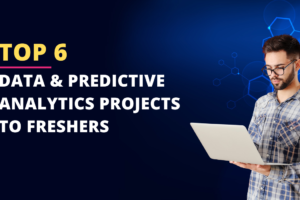
Top 10 Data Science Skills Trends in 2024
- Posted by Code4X
- Categories Data Science
- Date January 12, 2024
Embarking on a journey into the dynamic world of top data science skills is an exciting prospect, especially for students with humble academic backgrounds. As we step into 2024, the field is teeming with opportunities, and staying informed about the latest trends can be your key to success. Let’s explore the top 10 data science trends that are accessible and can help aspiring data scientists kickstart their careers.
Top Data Science Skills to Learn in 2024
Uncover the essential top data science skills to dominate in 2024 and stand out in the fiercely competitive job market. Mastering these top 10 skills is key to achieving unicorn status in the realm of data science. From Statistical Analysis to Python and R programming, Machine Learning, AutoML, and Cloud Services, each skill plays a pivotal role in staying ahead in this fast-paced industry. By refining both technical prowess and soft skills, you can establish yourself as an indispensable contributor, fueling innovation and expansion in the ever-evolving landscape of data science skills.
1. AI and Machine Learning Exploration – #1 Top Data Science Skills
Some of the key areas of learning for any data Science aspirant are here below –
Linear Regression: Foundation for understanding regression analysis, predicting numerical outcomes based on input features.
Logistic Regression: Used for binary classification problems, predicting outcomes with two possible categories.
Decision Trees: Tree-like models for making decisions, widely used for classification and regression tasks.
Random Forest: Ensemble learning method based on decision trees, known for robust performance.
K-Means Clustering: Unsupervised learning algorithm for partitioning data into clusters based on similarities.
Naive Bayes: Probability-based classification algorithm, particularly useful for text classification.
Support Vector Machines (SVM): Effective for both classification and regression tasks, particularly in high-dimensional spaces.
Principal Component Analysis (PCA): Dimensionality reduction technique useful for feature extraction and visualization.
Gradient Boosting Algorithms (e.g., XGBoost): Ensemble learning techniques that build a series of weak models to create a strong predictive model.
2. Neural Networks – #2 Top Data Science Skills
Neural networks are the backbone of many modern AI applications. Familiarize yourself with the basics of neural networks, understanding how they power innovations like image recognition, speech synthesis, and more.
Some of the most used Neural Network architectures are –
- Convolutional Neural Networks (CNN)
- Recurrent Neural Networks (RNN)
- Long Short-Term Memory Networks (LSTM)
- Gated Recurrent Unit (GRU)
- Autoencoders
- Generative Adversarial Networks (GAN)
- Siamese Networks
- Capsule Networks (CapsNets)
- Transformer
- Attention Mechanism
- BERT (Bidirectional Encoder Representations from Transformers)
3. Neural Networks- #3 Top Data Science Skills
NLP is a captivating field within data science. Explore sentiment analysis, language translation, and chatbot development. This skill is particularly useful for roles involving text analysis and interaction with language-based datasets.
Some of the Techniques widely used in NLP are here below, these are topics that a student of NLP needs to learn.
- Tokenization
- Part-of-Speech Tagging (POS)
- Named Entity Recognition (NER)
- Stemming and Lemmatization
- Word Embeddings
- Sequence-to-Sequence Models
- Attention Mechanism
- Transformer Architecture
- BERT (Bidirectional Encoder Representations from Transformers)
- Sentiment Analysis
- Text Classification
- Question Answering Systems
4. Generative AI – #4 Top Data Science Skills
Get acquainted with generative AI, where machines learn to generate new content – Text (Natural Language) or Images, based on given Instructions (Prompts). Generative AI is bringing a massive shift on Content Generation including Code generation and is a very sought after skillset amongst Data Scientists. Some of the Skillsets that an aspiring Gen AI Data scientist should learn are GPT or BARD API, Vector Databases, Gen AI Frameworks like Langchain, etc.
5. Data Visualization and Analytics Proficiency – # 5 Top Data Science Skills
Develop skills in data visualization tools. Learn how to communicate insights effectively through charts and graphs. This skill is valuable for roles where conveying complex information in a visually appealing manner is essential. Some of the skills that would be very useful to become a Data Science based Analytics professional are Python and R Languages, Visualisation Libraries, Statistics, tools like Tableau or Power BI, etc.
6. Python Programming Mastery – Top 1 Data Science Skills
Python is the language of choice for many data scientists. Enhance your Python programming skills, focusing on libraries like NumPy, Pandas, and Scikit-Learn. Proficiency in Python is a must for a wide range of data science roles.
7. Cloud Computing Basics – Top 7 Data Science Skills
Familiarize yourself with cloud computing platforms like AWS, Azure, or Google Cloud. Understand how to leverage cloud services for data storage, processing, and deployment. Each of these cloud platforms provide their own ML platforms that can be leveraged easily to build ML models and tools.
- AWS: Amazon Sagemaker, DeepLens, DeepComposer, etc.
- AZURE: AZURE ML, AZURE Cognitive Services.
- GCP: Cloud AI, Tensorfloww Extended (TFX), AutoML, etc.
8. Machine Learning Model Deployment
Learn the basics of deploying machine learning models. Understand how to take your models from development to production. Just as your Applications have to be packaged and deployed, mostly as containers, the same applies to your ML models through the application of ML-Ops (DevOps for ML Models). You may use the same container platforms like Docker, Kubernetes for ML Model containerisation, each of the Cloud platforms provide ML Ops tools, FASTAPI, Flask, Streamlit are some other platforms through which you may build APIs for your ML Models.
9. Time Series Analysis Exploration
Delve into time series analysis, a critical skill for roles dealing with sequential data like stock prices, weather patterns, and more. Understand how to extract insights and make predictions from time-ordered datasets. Some of the techniques that you may learn are: ARIMA, SARIMA, LSTM, GRU, XGBoost, Prophet and so on.
10. Research and Experimental Mindset
- A research and experimental mindset is crucial to become a data scientist, as it empowers them to navigate the complexities of the field, discover insights, and innovate in problem-solving. Here’s how cultivating a research and experimental mindset benefits a data scientist –
- Problem Framing
- Curiosity and
- Exploration
- Hypothesis Testing
- Iterative
- Experimentation
- Adaptability
- Continuous Learning
- Rigorous Methodology
- Creative Problem-Solving
- Communication of Findings
- Risk-Taking and Innovation
- Ethical Considerations
Embarking on a career in data science doesn’t require an extraordinary academic background. By focusing on these accessible trends and building a strong foundation in essential skills, aspiring data scientists can set themselves on a path towards success in 2024 and beyond.`
Tags: Top Data Science Skills, Top 10 Data Science Skills, Top Trend Data Science Skills, Data Science skills in 2024
Next post
5 Machine Learning Algorithms for Beginners - Stepping into the AI Playground
You may also like

Best Data Analytics Projects for Student


